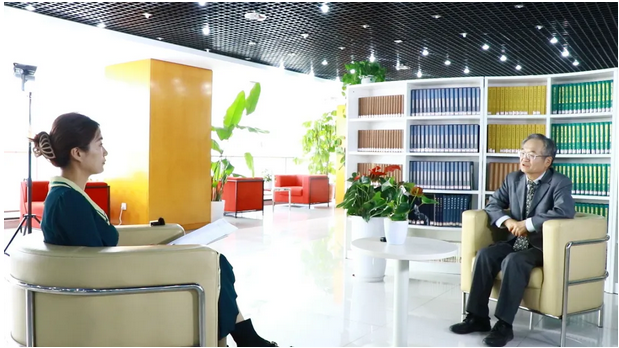
Guest Profile

Sun Fuwan, a professor, began his career as a teacher at the School of Marxism in 1989. He serves as the director of the Centre for Studies of Traditional Chinese Culture, and concurrently holds concurrent positions as a director of the International Confucian Association, executive director of the Chinese Society of Shixue, and executive director of the China Zhouyi Society. He has authored or edited several works including Interpretation of the Analects with the Classics of Changes and has published over 40 articles on philosophy, Classics of Changes, and pedagogy in publications such as Guangming Daily, Journal of Peking University, Academic Monthly, and Chinese Journal of Distance Education. His work Introduction to Philosophy of Distance Education won the first prize for Outstanding Scientific Research Achievements in the National Radio and TV University System in 2008, and Interpretation of the Analects with the Classics of Changes was included in the book list for officials to study by the Chang'an Street Reading Club in Beijing.
Q: Would you please reflect on your career?
A: I began my career at the university after graduating from Renmin University of China as a postgraduate in 1989. Time has flown by, and this year marks my retirement age. Over the past 35 years, I have been employed at the Open University of China (OUC). As per the university's arrangements, I have been reassigned several times. Initially, I joined the China TV Normal College, which later merged with the Central Radio and TV University (CCRTVU) and was renamed internally as the Department of Teacher Education.
Q: Could you share some highlights from your career?
A: The Department of Teacher Education is where I spent the longest period of my career, a total of 18 years. One of my most memorable experiences there was being involved in the establishment of the Primary School Education programme. This programme was a completely new major, characterised by its comprehensive nature and the breaking down of disciplinary barriers. Since its inception in 2000, it has consistently ranked first in terms of student enrolment among all programmes at the university. The establishment of this programme played a crucial role in enhancing the education qualifications of elementary school teachers in remote areas and made significant contributions.
During my time working at Research Institute of Open and Distance Education, one particularly memorable experience was participating in editing and publication of the "Case Studies on World Open Universities" series. I also authored the book "Research on the Open University, UK, which has had some impact in the academic community.
During my tenure at the News Centre, one event that left a deep impression on me was when we invited journalists from major national media outlets to form a press delegation (OUC Journey) to visit the frontlines of open universities, meeting with and promoting our students, including graduates. I believe this initiative had a significant impact at the time.
During the years at the School of Marxism, under the strong leadership of the university's Party Committee, the school successfully rolled out comprehensive ideological and political courses for its four to five million students. At the same time, a new major in Party Affairs Management was established. Looking back, these achievements are truly unforgettable.
Starting from 2014, I have become more and more interested in in traditional culture. In 2018, I published a book titled Interpretation of the Analects with the Classics of Changes and in 2019, I had the honour of participating in an international academic symposium commemorating the 2570th anniversary of Confucius' birth at the Great Hall of the People. I was also honoured to be appointed as a director of the International Confucian Association.
Q: Will you please offer some hopes and advice to young teachers, especially from the perspective of traditional culture?
A: Regarding my hopes and advice for young teachers, I would like to share two points based on my personal experiences in work.
In the first place, I believe the Open University represents a new type of institution of higher education. If we trace its origins back to the Radio and TV University, it was conceived during the era of reform and opening up, having been directly endorsed by Comrade Deng Xiaoping. Throughout the years, despite facing certain challenges and setbacks, the overall trend of its development has been consistently positive and robust. What accounts for this? It's because the educational philosophy that we uphold is dedicated to serving the construction of a learning society where lifelong learning is pursued by all. The philosophy truly encapsulates the essence of Chinese education and is something that we, as educators, should regard not only as a profession but as a noble cause to pursue. This is my personal perspective.
Next, when discussing traditional culture, as young teachers or individuals, what significance does learning traditional culture hold? From a macro perspective, it is about responding to the Party's call to adapt Marxism to the Chinese context and the needs of our times through learning, dissemination, and the inheritance and promotion of traditional Chinese culture. On another level, I believe that the essence of the Chinese spirit is embodied in traditional culture. By consciously learning and disseminating it, we can embody the fine aspects of traditional Chinese culture, which greatly contributes to enhancing our personal qualities. This is because the fine traditional Chinese culture encompasses the infinite wisdom of Chinese civilisation, offering valuable insights for young people to address many contemporary challenges.
Q: What are your good wishes for the university?
A: This year marks the 45th anniversary of the OUC, a milestone that also signifies a period of great prosperity for the institution. On this occasion, I sincerely wish the OUC continued vigour and a bright future in this new era, making significant contributions to the construction of a learning society where lifelong learning is pursued by all.